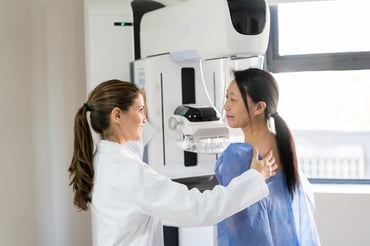
Routine cancer screening has played a crucial role in reducing mortality rates over the past 50 years. However, specific guidelines for cancer screening in transgender and gender-diverse (TGD) patients are currently lacking, despite the development of Standards of Care by the World Professional Association of Transgender Health (WPATH). In this blog post, we highlight the importance of cancer screening for trans and nonbinary individuals, providing recommendations based on cisgender protocols in the absence of TGD-specific guidelines. By understanding the unique considerations and potential risks, TGD patients can make informed decisions regarding their health and well-being.
Breast Cancer Screening for the TGD Community
Transgender men and nonbinary individuals may have unique risks related to breast cancer. While chest reconstruction methods, such as keyhole and periareolar surgery, remove most breast tissue, some may remain. Regular breast cancer evaluation is advised for trans men who have undergone top surgery. Recommendations for breast cancer screening in transgender men and nonbinary individuals are as follows:
- Mammogram usually appropriate:
- Patients aged 25-30+ with a breast reduction or no chest surgery and a personal or family history of breast cancer.
- Patients aged 40+ with a breast reduction or no chest surgery should discuss a yearly or biennial mammogram.
- Mammogram not usually appropriate:
- Patients who have undergone a bilateral (double) mastectomy.
For transgender women and nonbinary individuals, breast cancer screening recommendations are as follows:
- Mammogram usually appropriate:
- Patients aged 25-30+ with past or current use of hormones for 5+ years and a personal or family history of cancer.
- Mammogram may be appropriate:
- Patients aged 25-30+ with no past use of hormones or hormone use for <5 years and a personal or family history of cancer.
- Patients aged 40+ who have been receiving hormone therapy for five+ years should discuss a yearly or biennial mammogram.
- Mammogram not usually appropriate:
- Patients who have not had hormone therapy or who have had hormone therapy for <5 years.
Gynecologic Screening for the TGD Community
Cervical cancer screening guidelines for transgender men and nonbinary individuals, based on the recommendations of the American Cancer Society, are as follows:
- Patients aged 25+ should begin cervical cancer screening.
- Patients aged 25-65 should have a primary HPV test or co-test (HPV and Pap combined) every five years or a Pap test alone every three years.
- Patients who have received the HPV vaccination should follow guidelines for their age groups.
- Patients who have had their uterus and cervix removed do not need to continue screening unless removal was due to cancer or a serious pre-cancer.
Prostate Screening for the TGD Community
Prostate cancer incidence in trans women appears to be lower than in cisgender men due to androgen (hormone) deprivation combined with estrogen and progesterone therapy. However, the risk of prostate cancer remains for those with a prostate gland, including those who have undergone gender-confirming surgery. Recommendations for prostate screening in TGD individuals are similar to cisgender protocols:
- Digital rectal exam (DRE) to assess prostate size and shape.
- PSA (prostate-specific androgen) test to measure PSA levels in the blood.
- MRI if further evaluation is recommended.
Ensuring access to appropriate cancer screening for transgender and nonbinary patients is crucial for early detection and treatment. While specific guidelines for TGD individuals are still evolving, following cisgender protocols can help identify potential risks and promote proactive healthcare. Finding a healthcare provider who is knowledgeable, sensitive, and experienced in TGD healthcare is essential.
Akira Medical Imaging + Wellness is a New York Oncology Hematology (NYOH) affiliate imaging center. Akira is not just another imaging center—it’s an extension of the trusted care you know from NYOH. For over 35 years, NYOH has been a leading name in cancer care, and now, that same level of expertise and compassion is available through our state-of-the-art imaging services at Akira.
Akira Medical Imaging + Wellness offers:
- Diagnostic and screening mammograms
- Breast and pelvic ultrasounds
- Breast biopsies
- Bone density (DEXA) scans
Speak openly with your doctor about your medical history. It’s important to gain a comfort level about these topics so you can be informed and stay on-schedule based on your specific needs.

